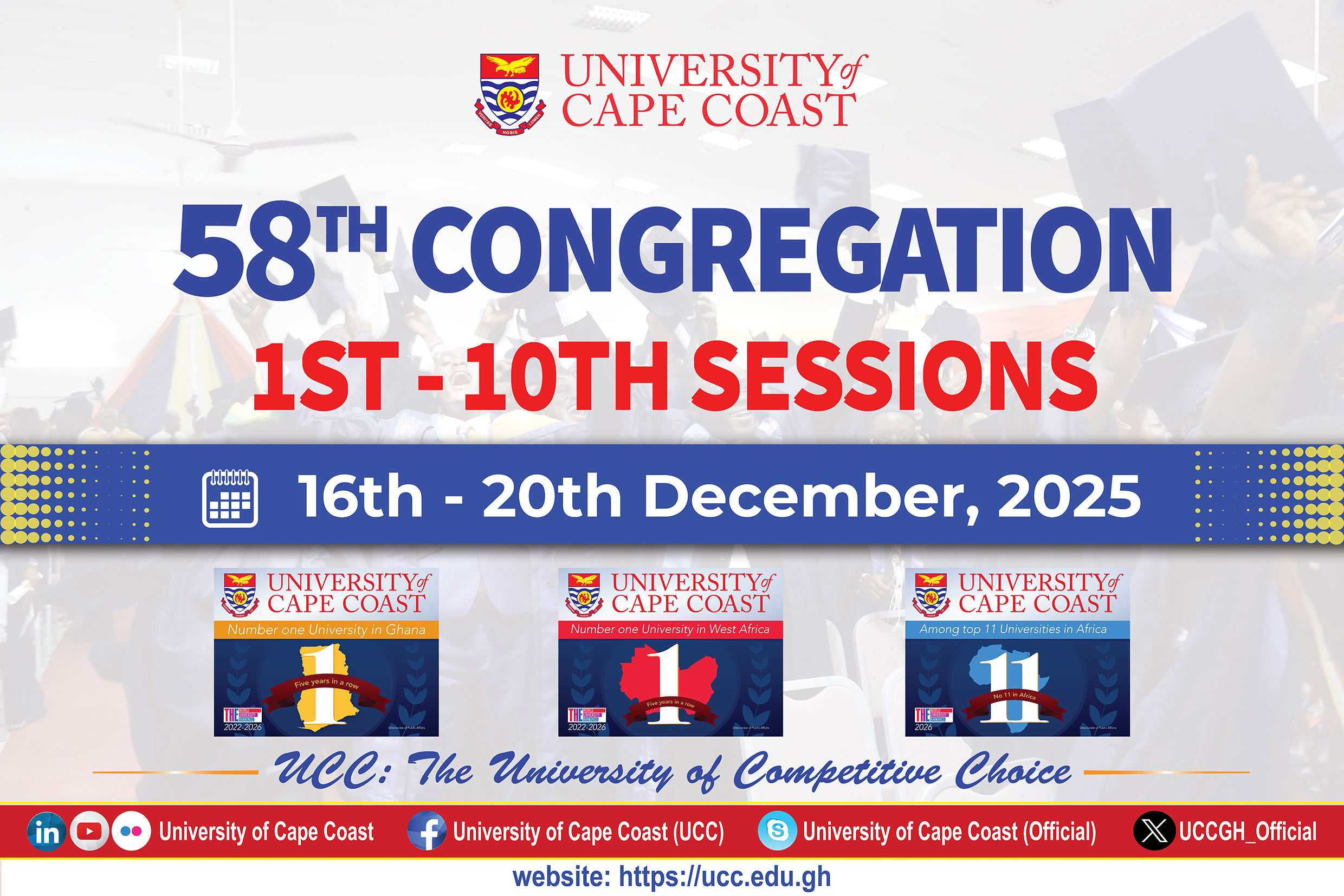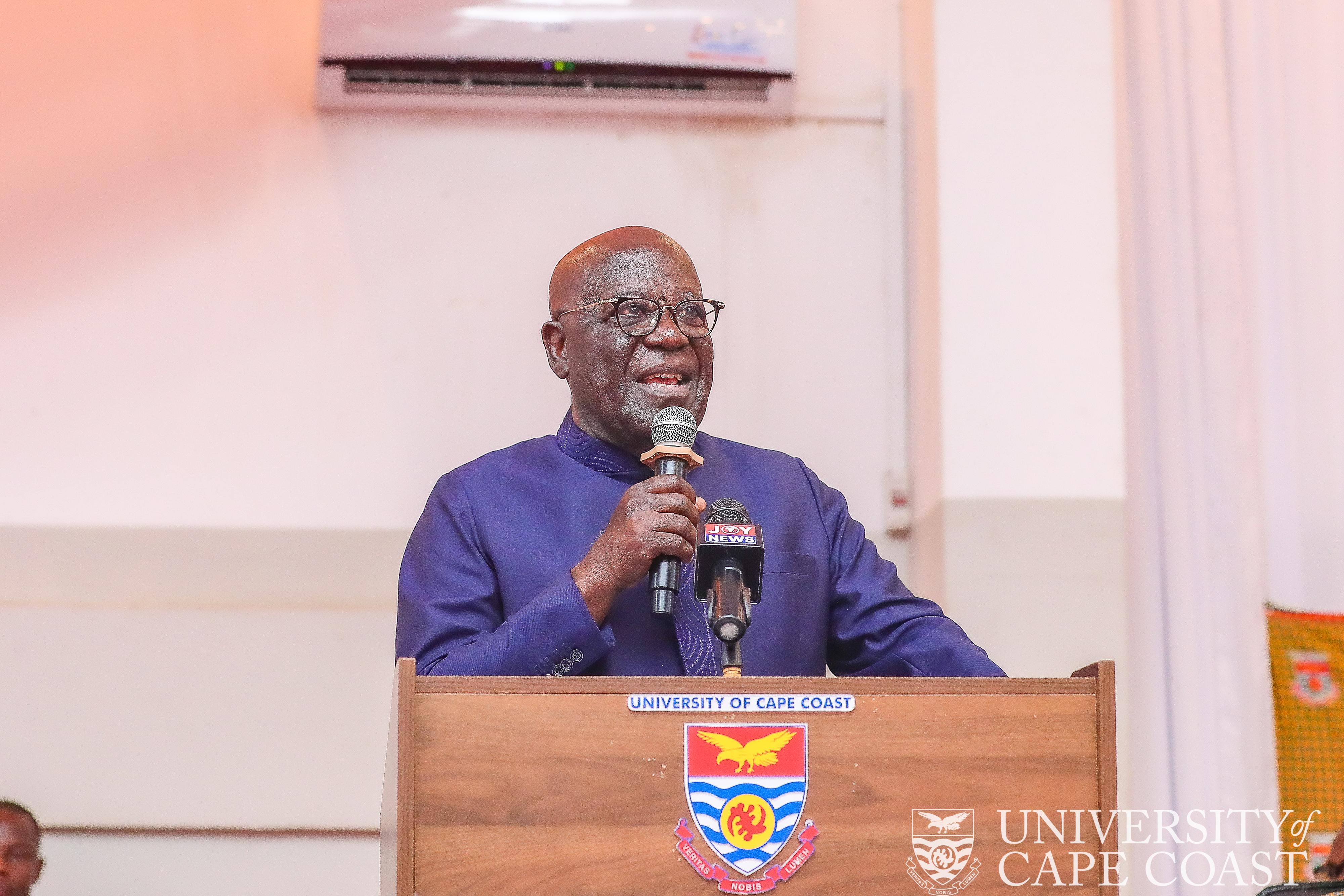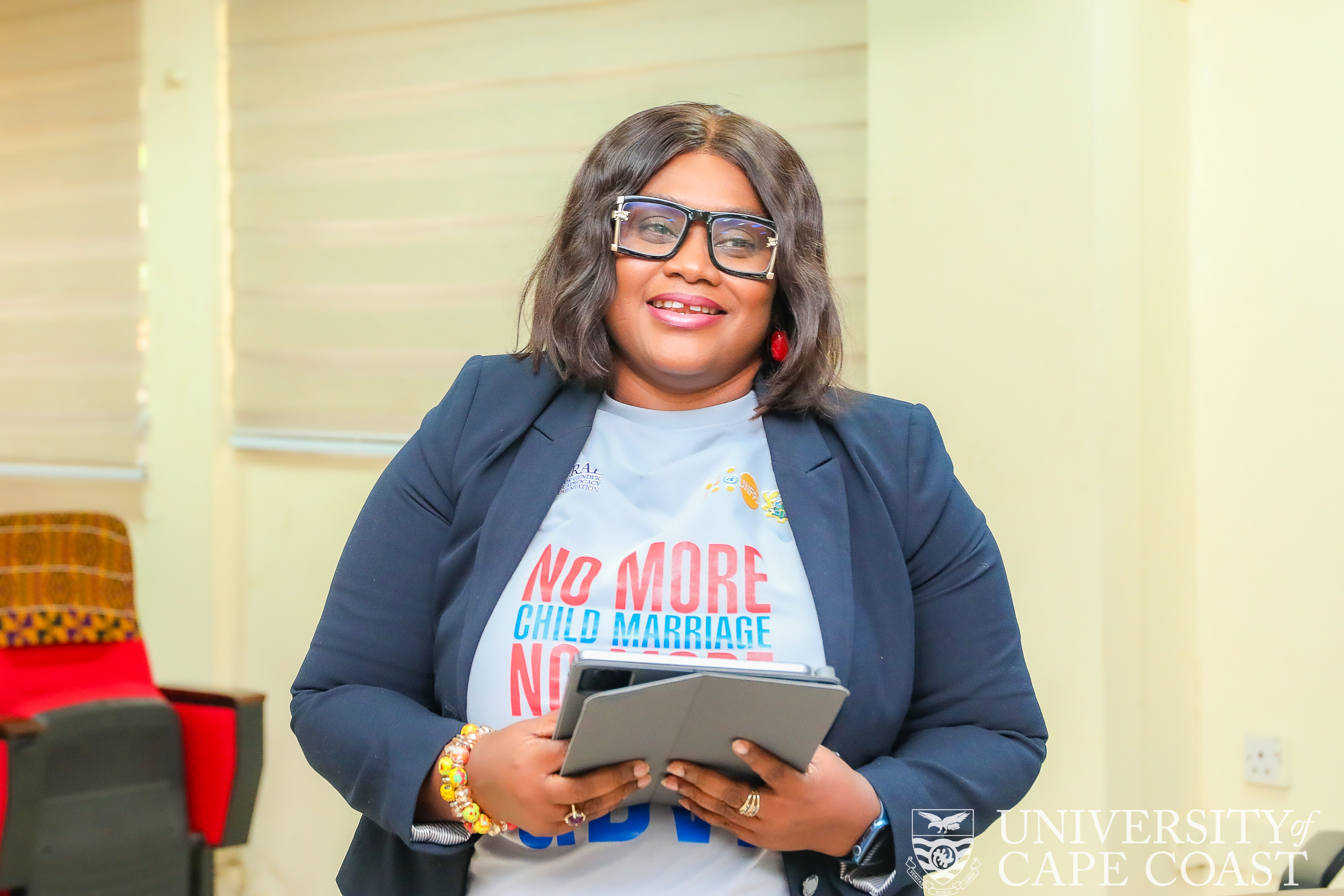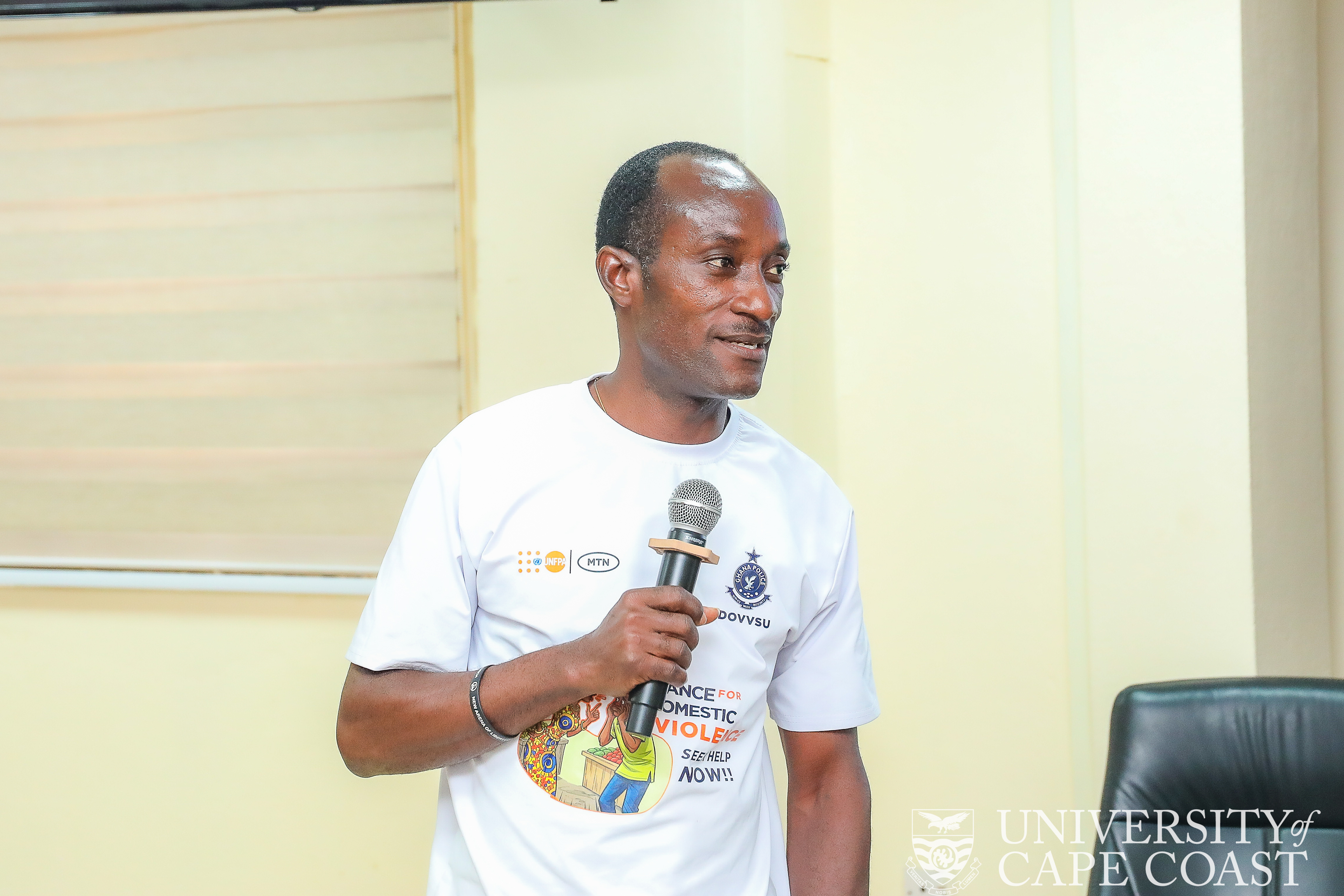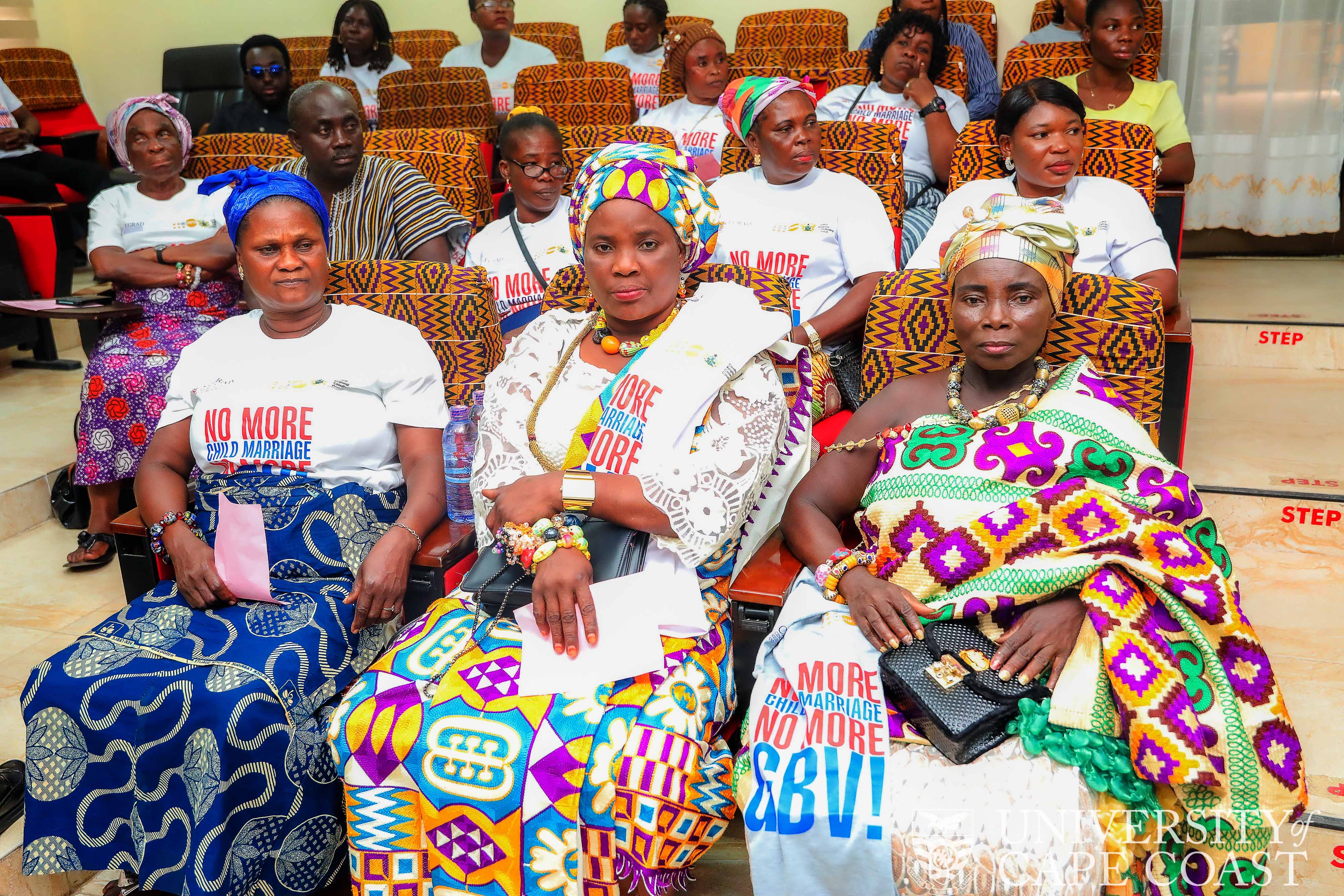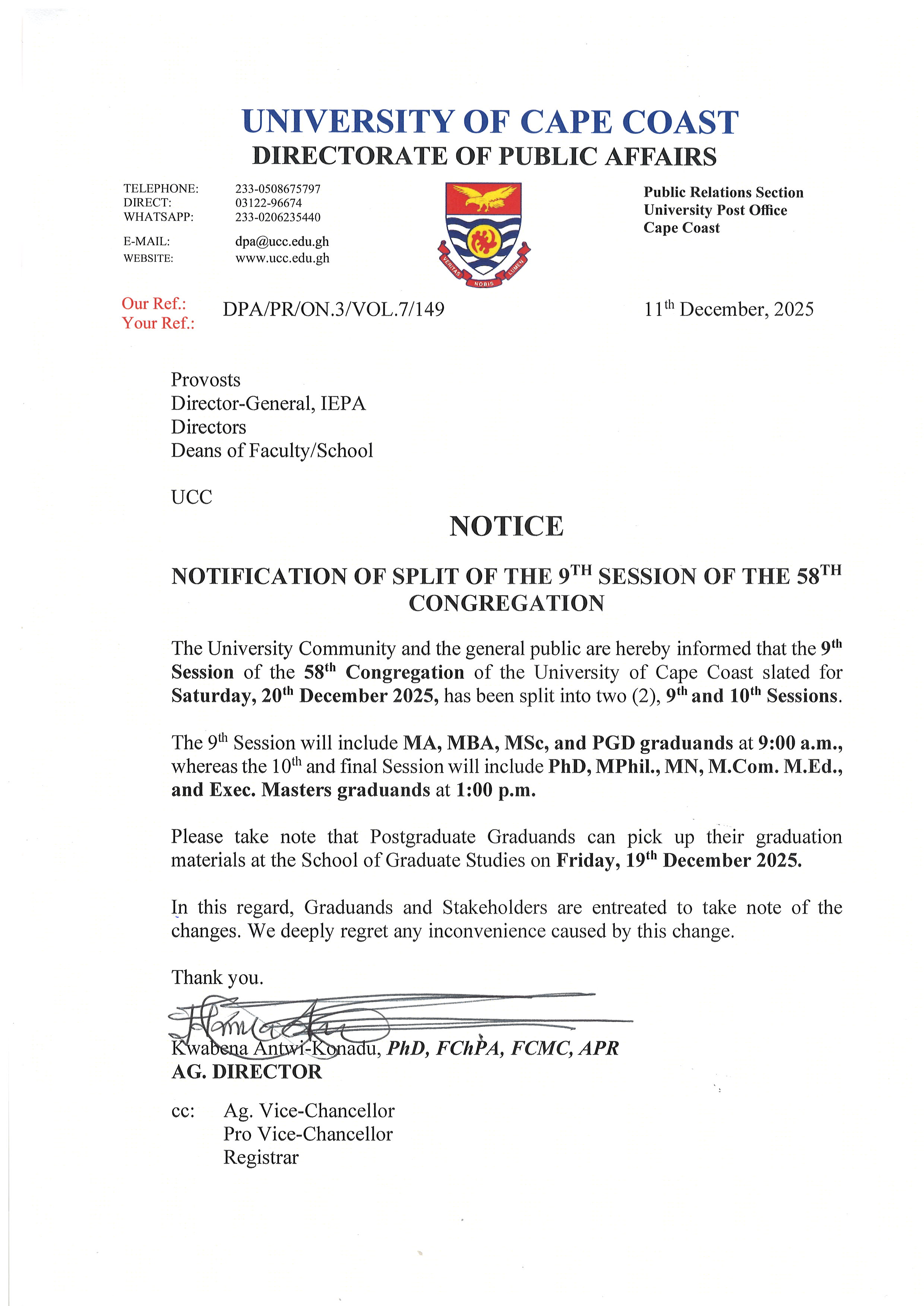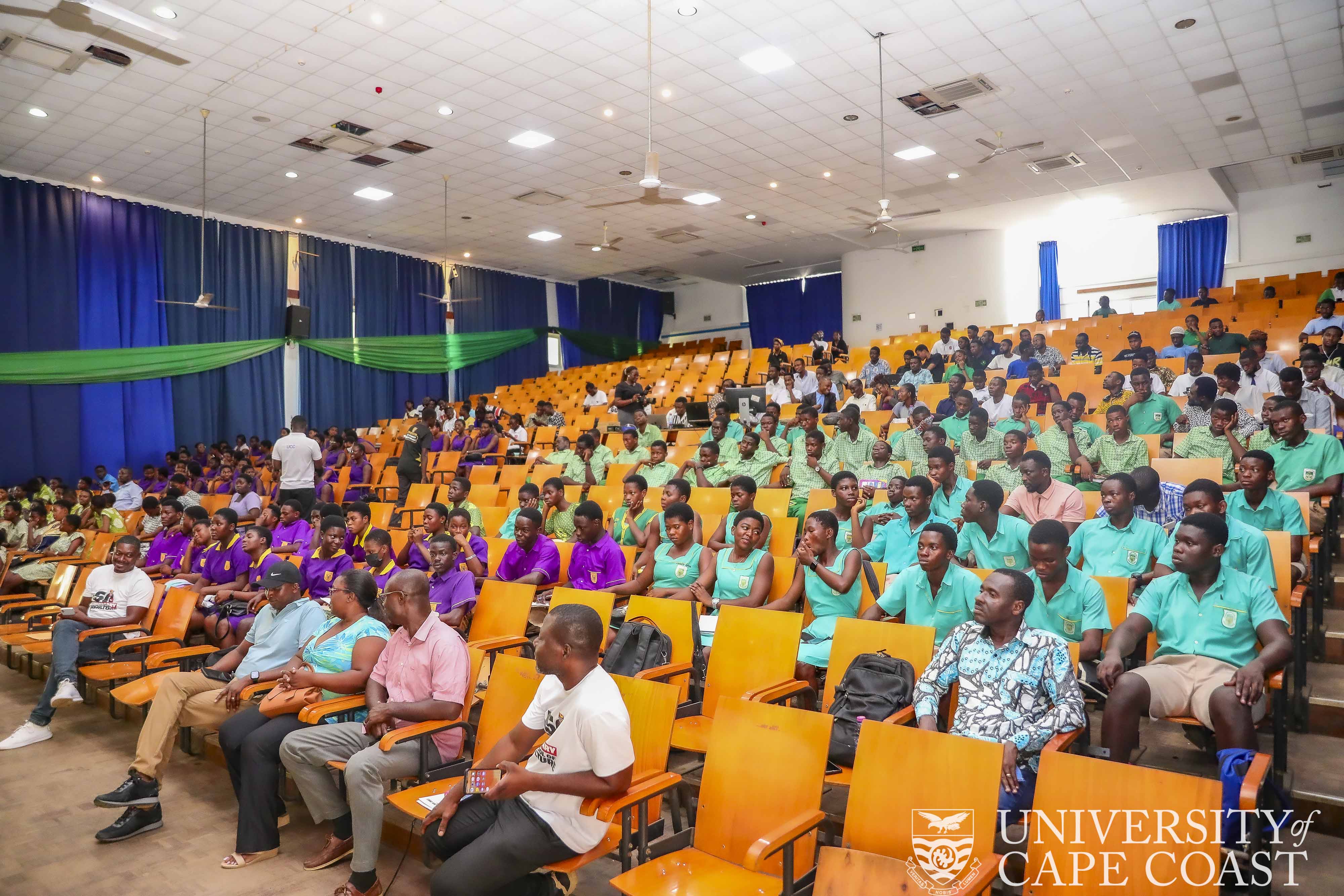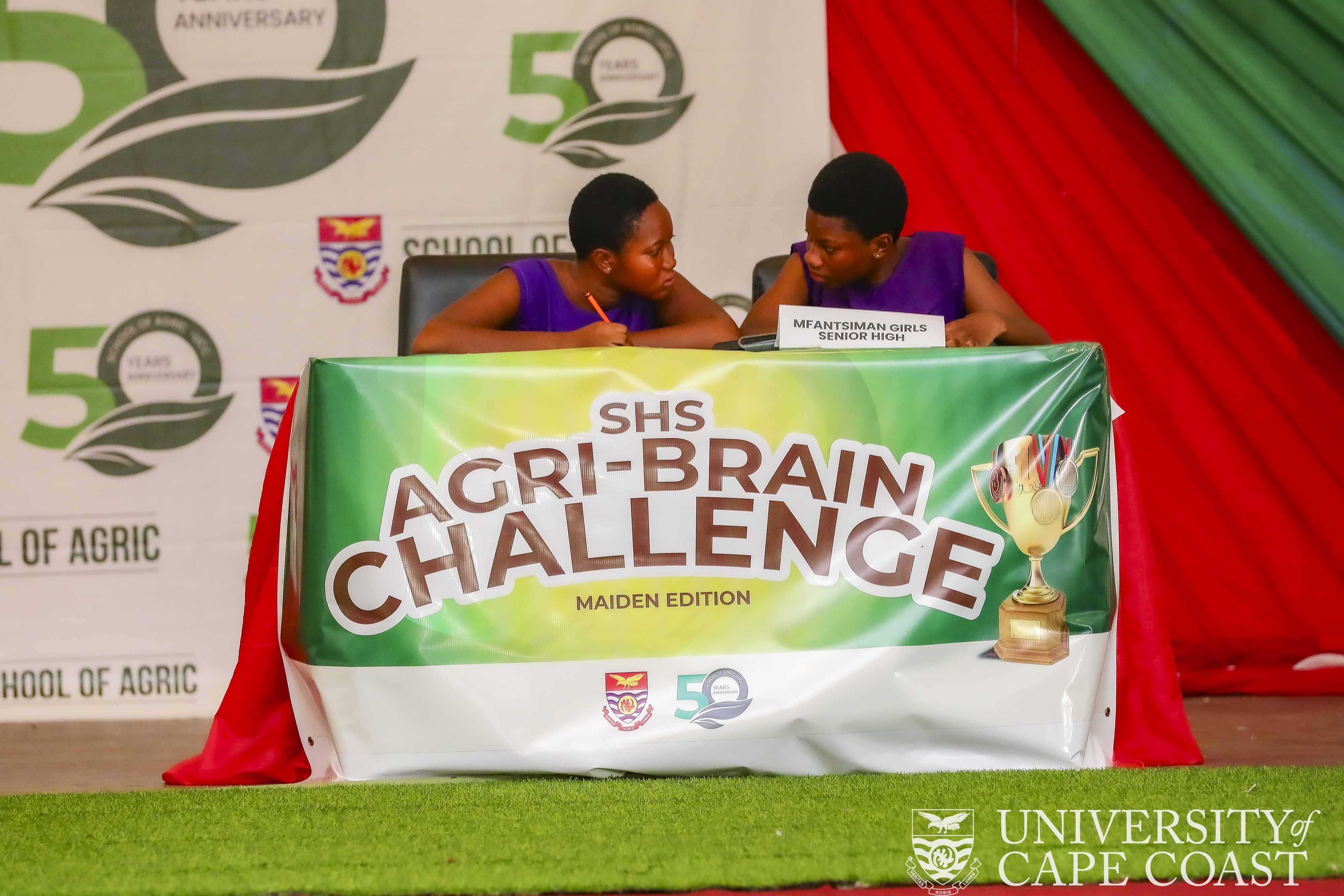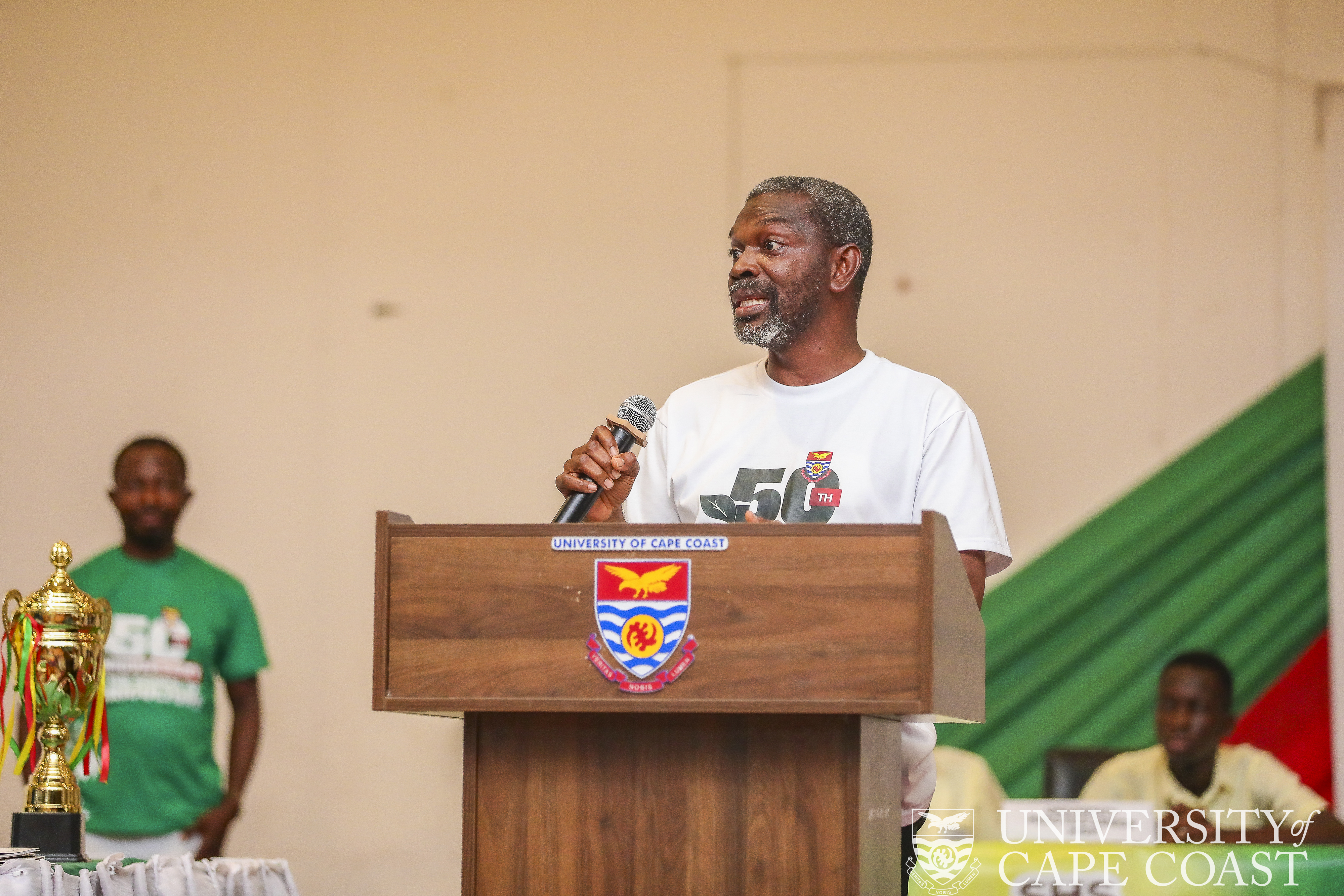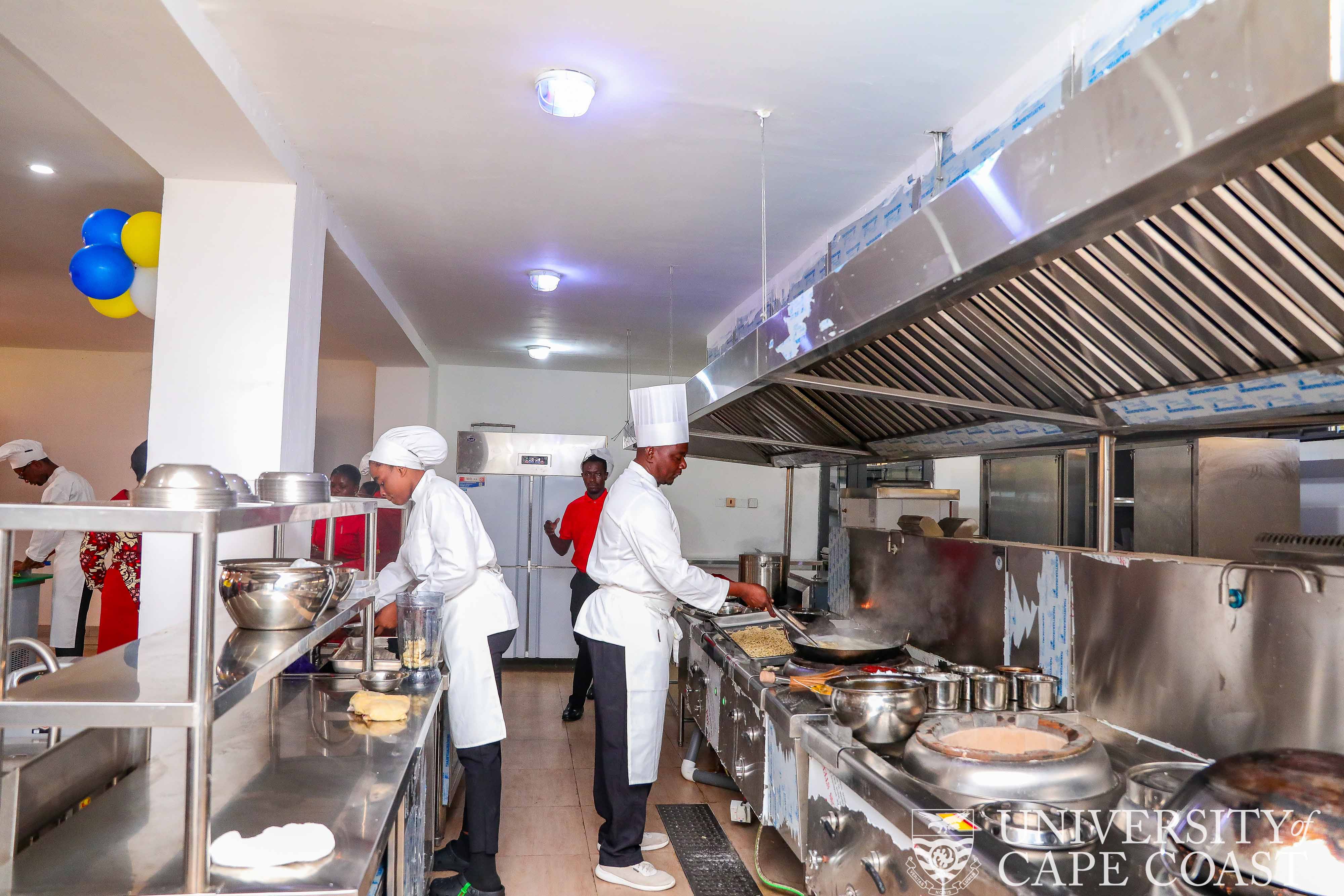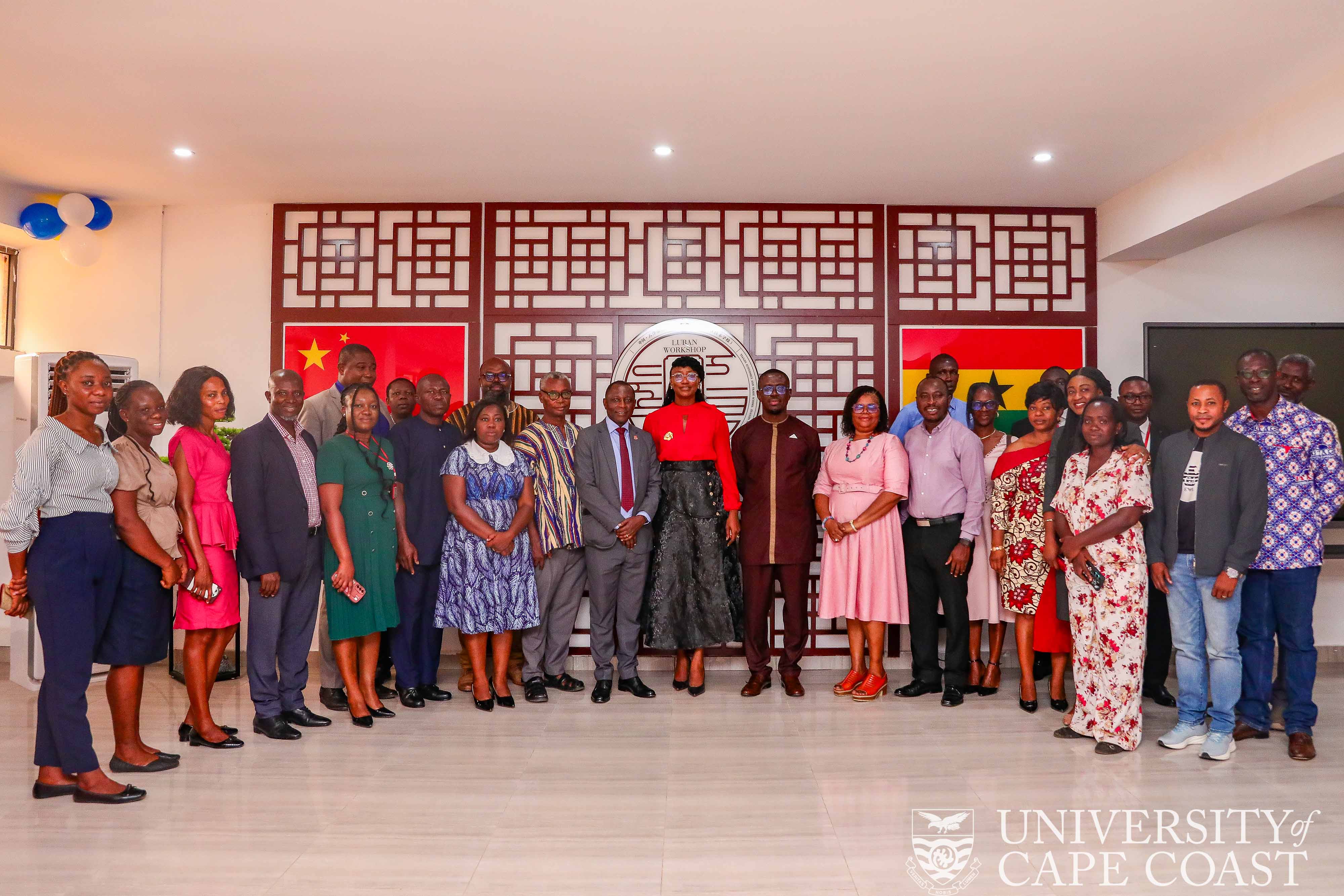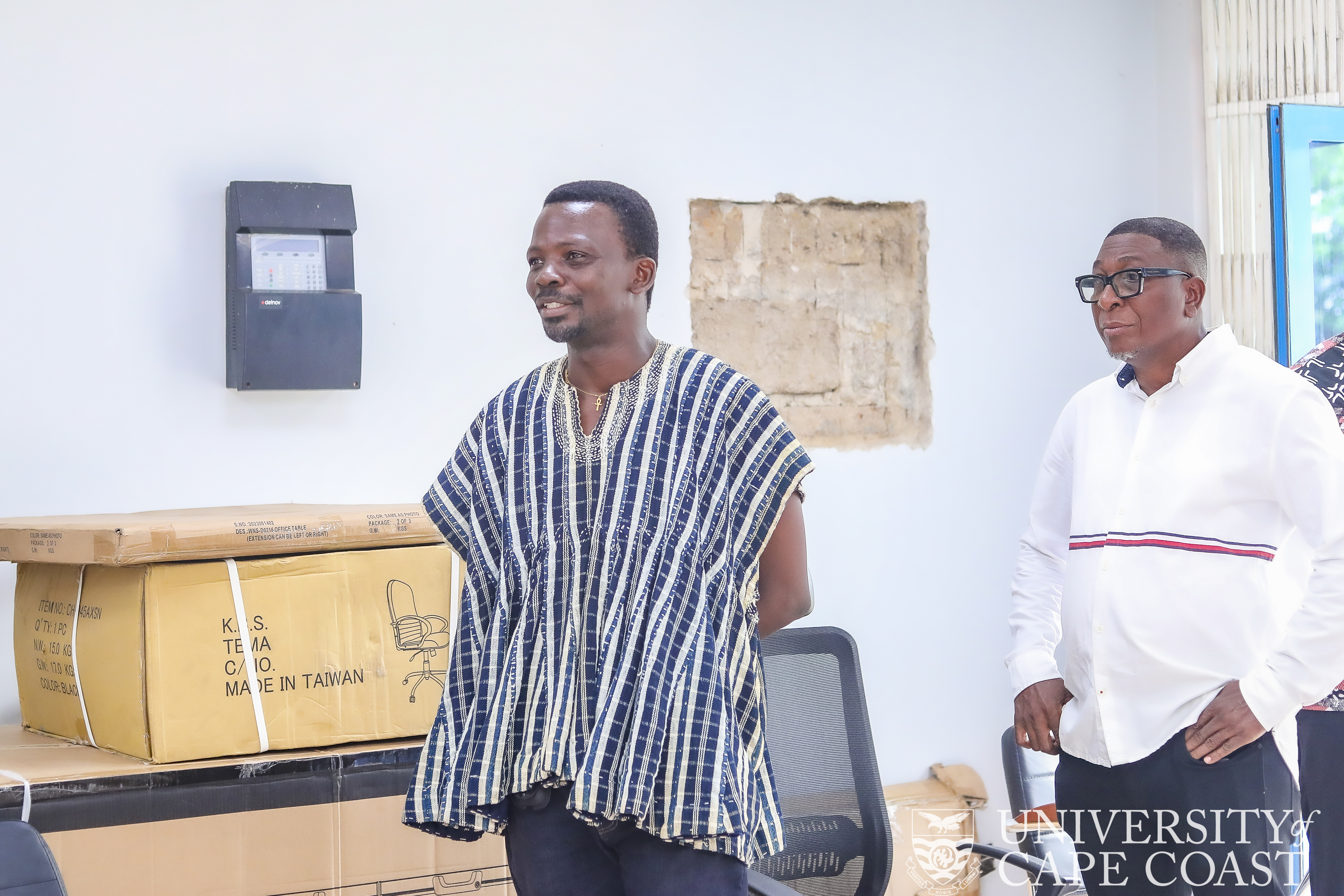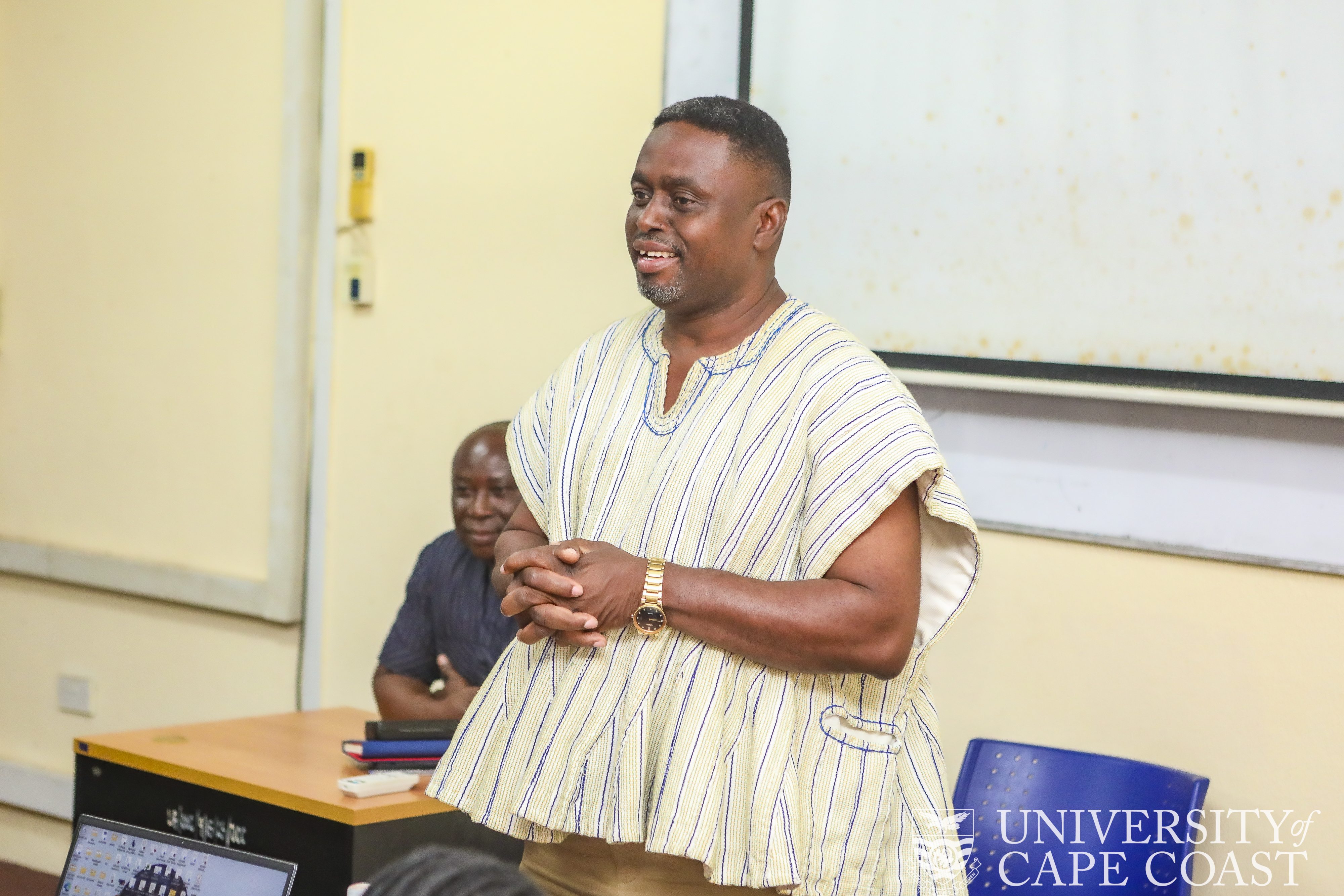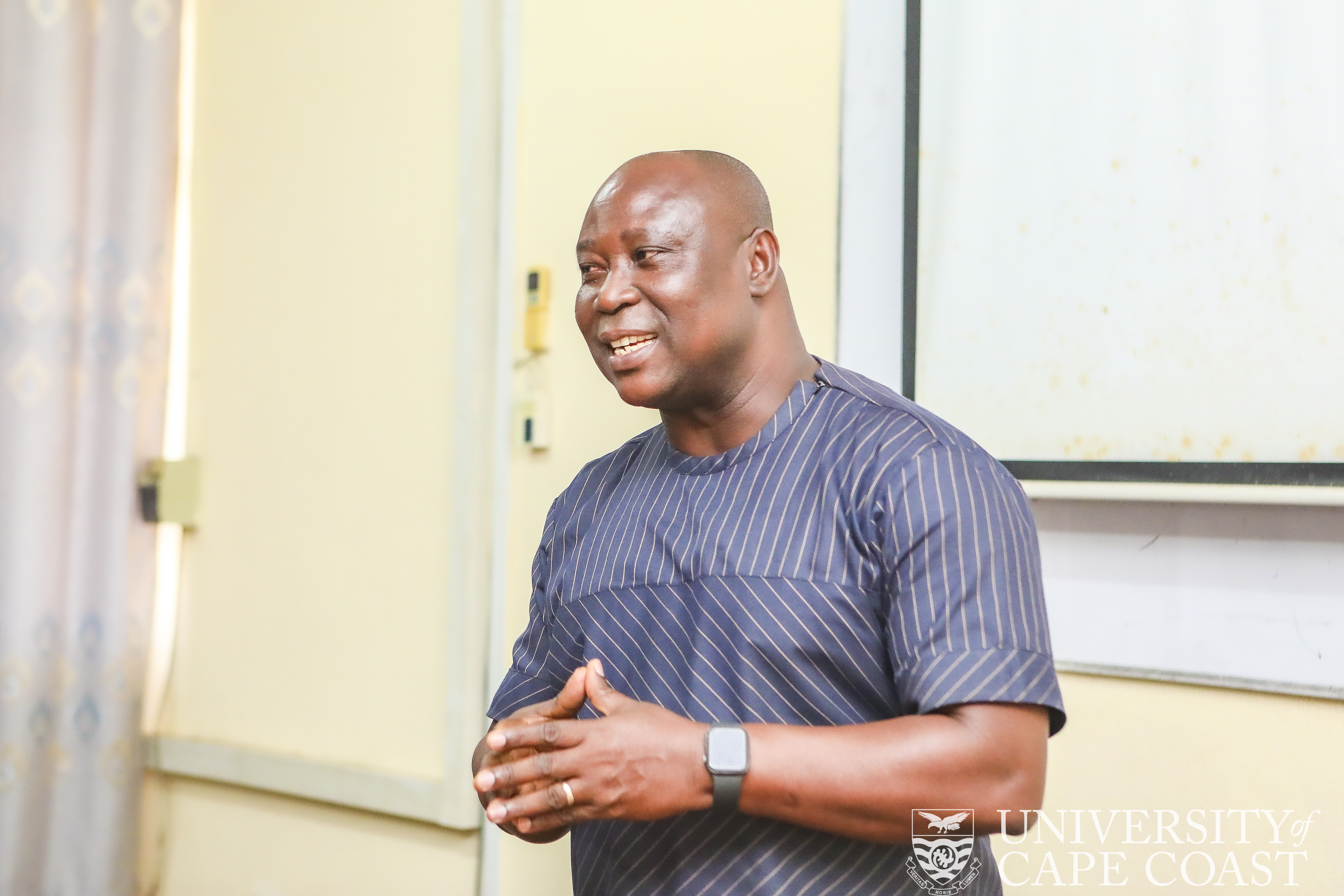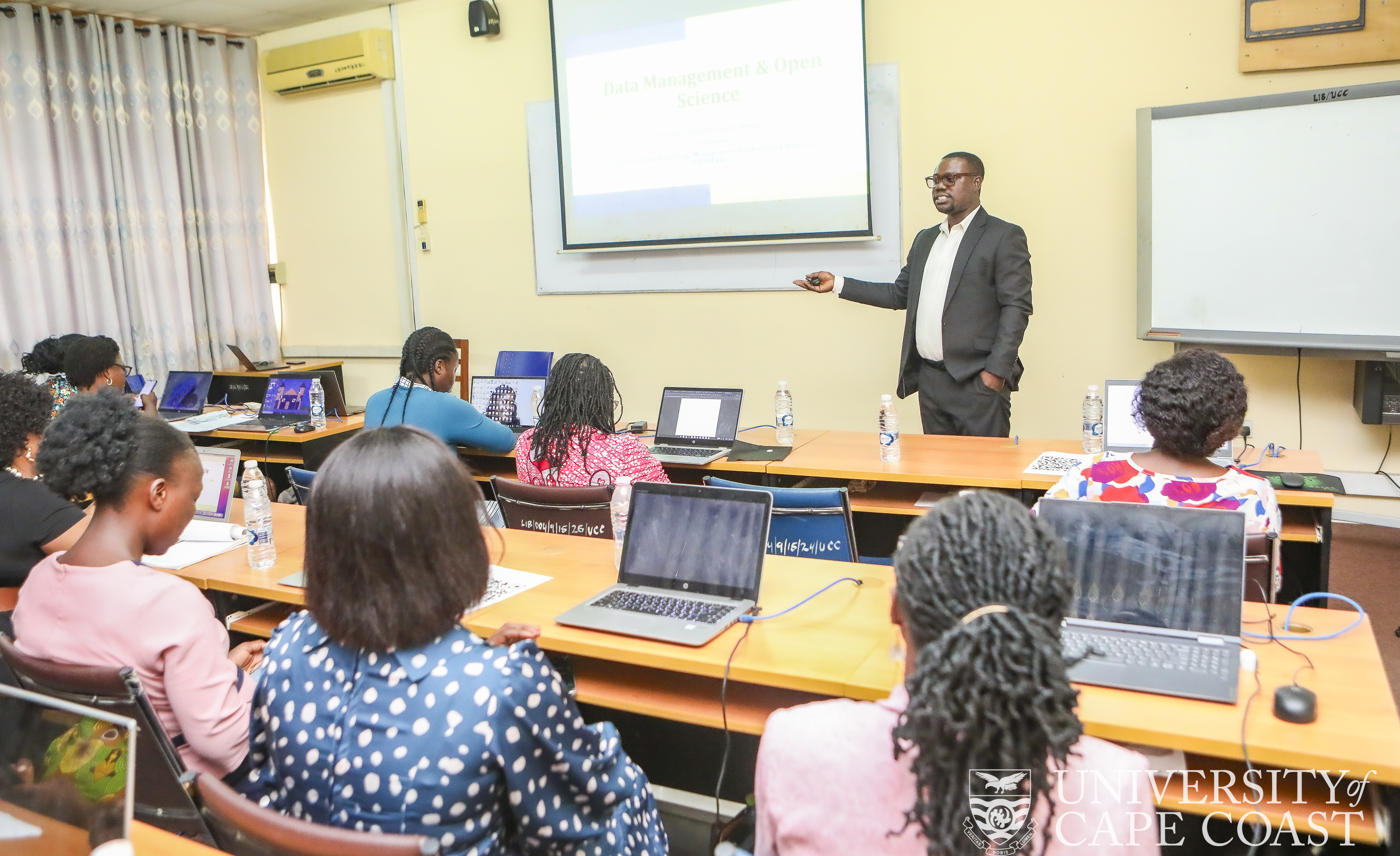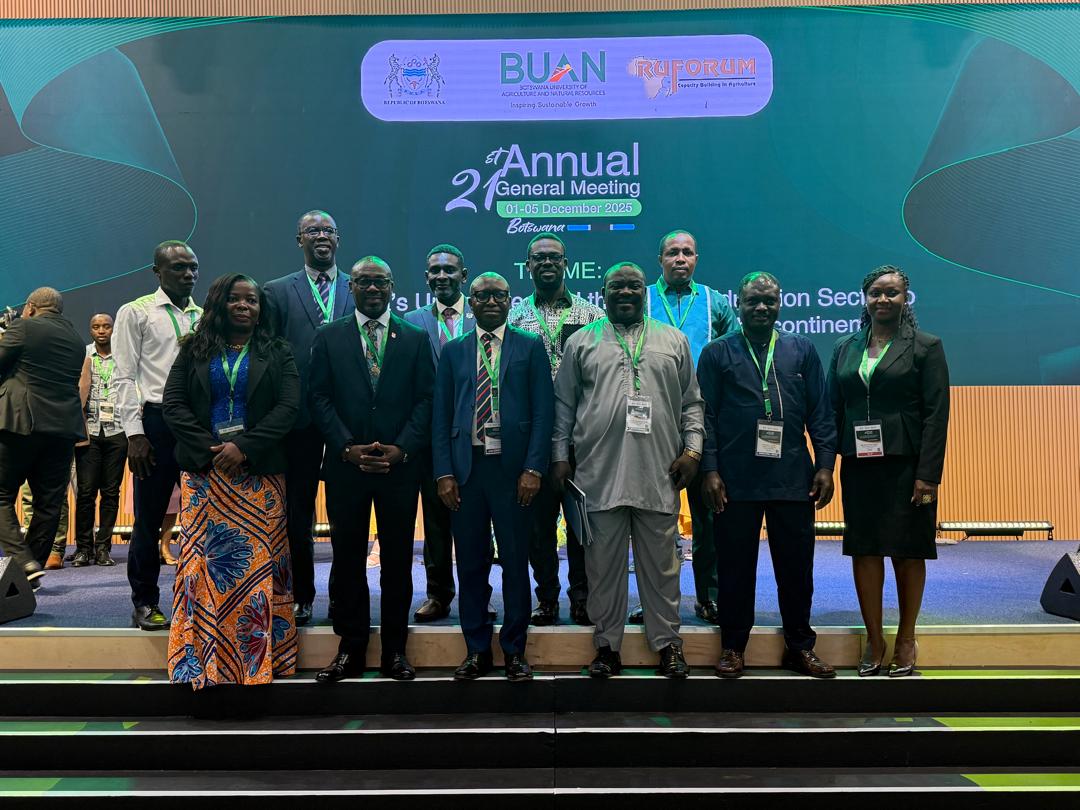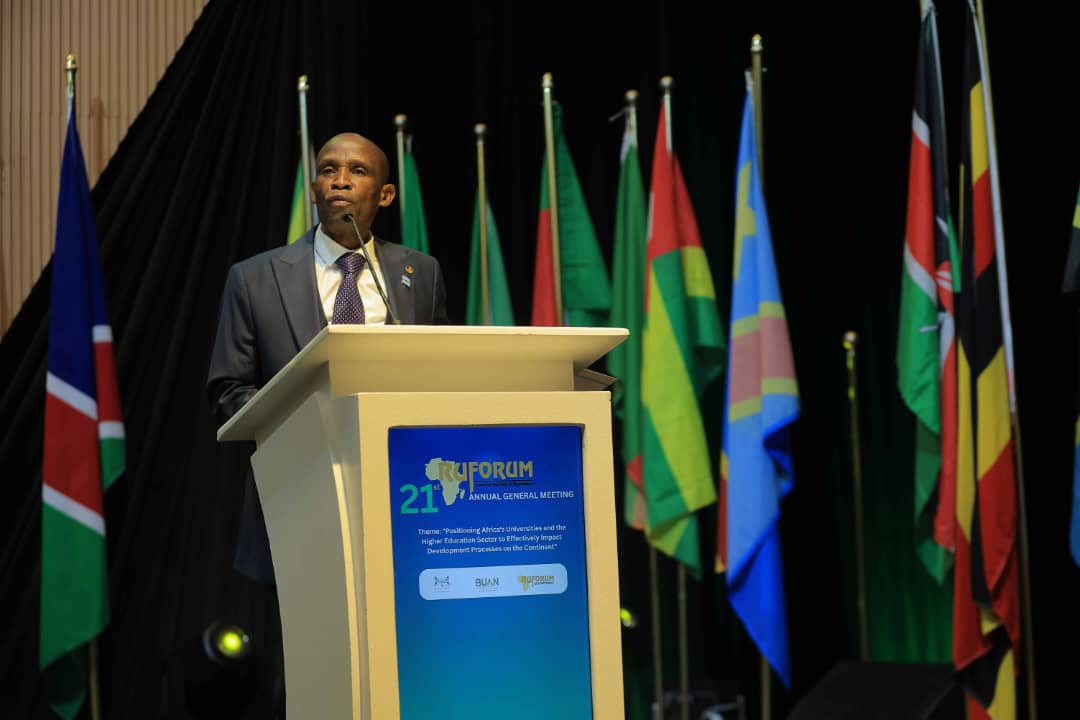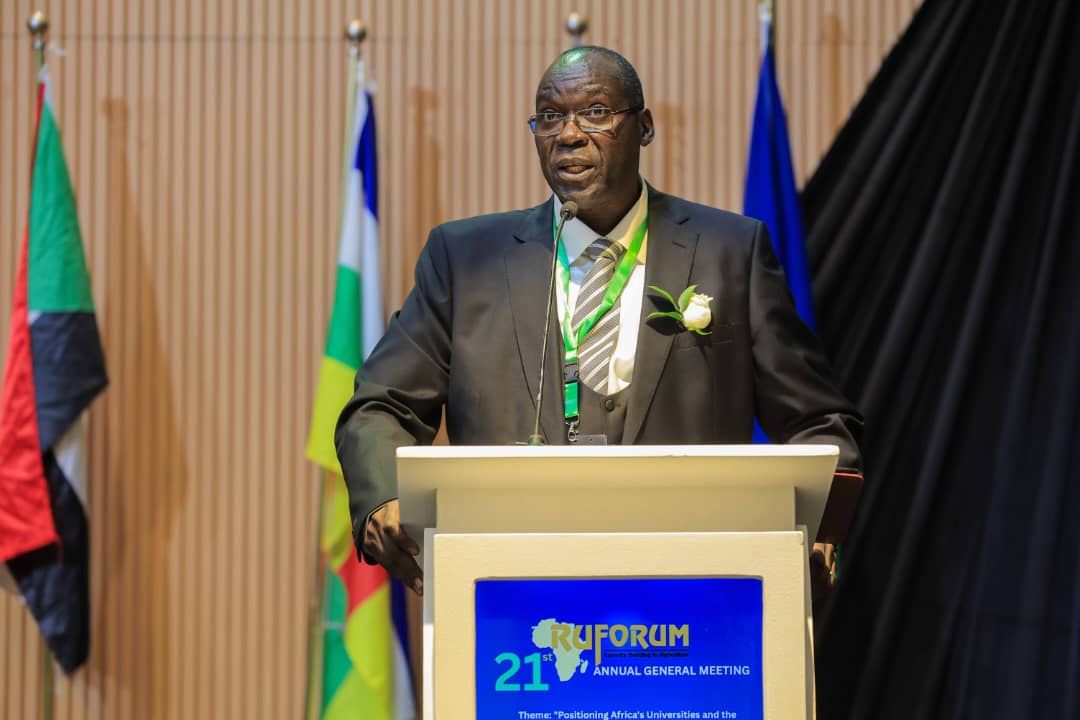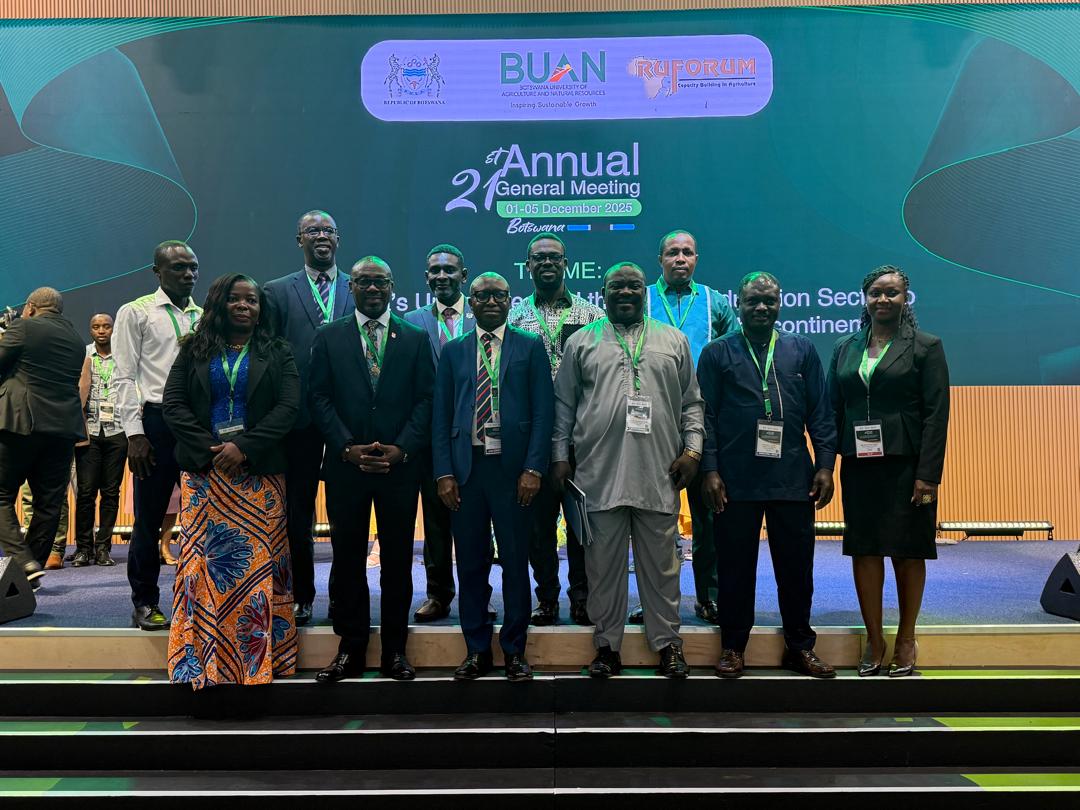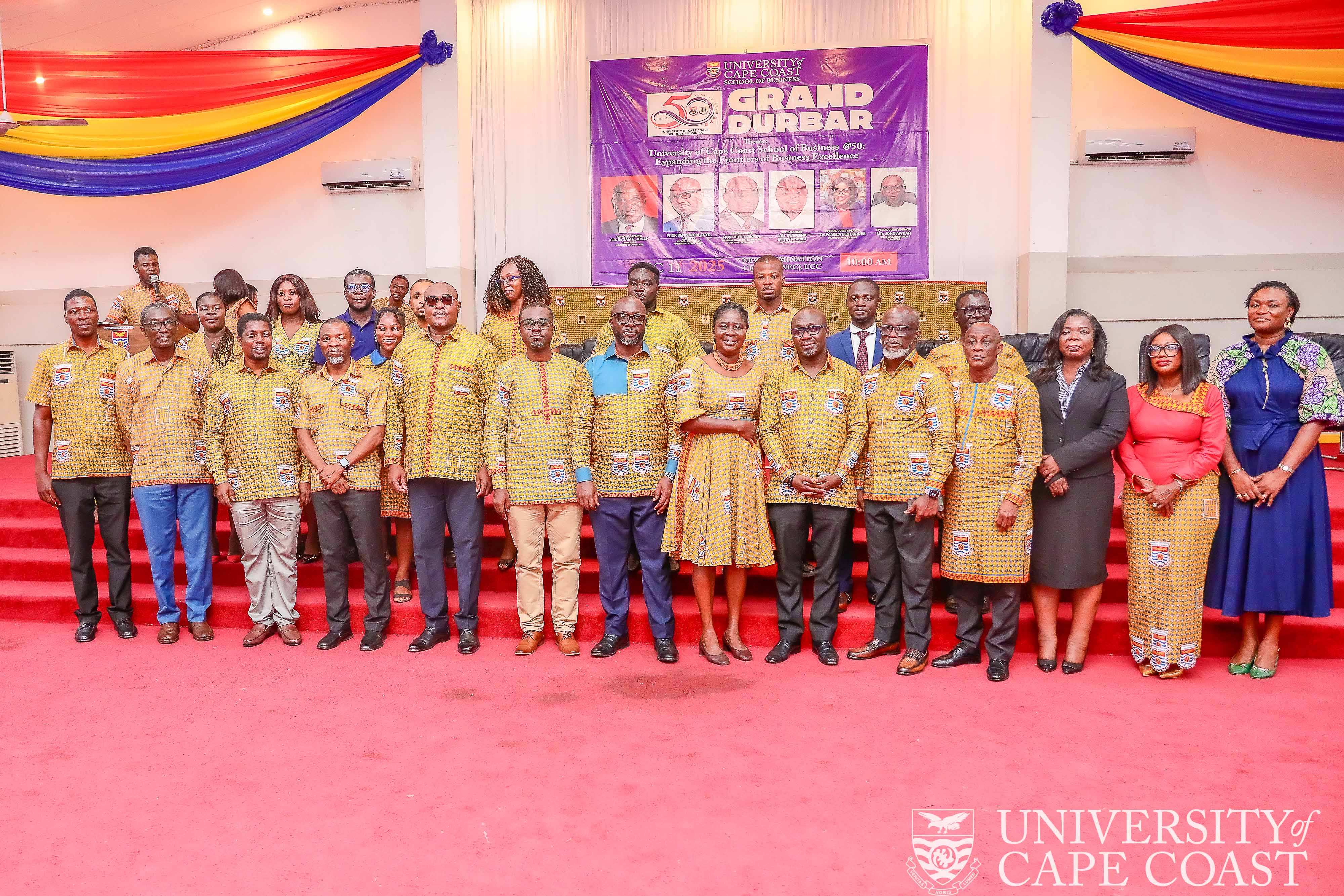
The School of Business, University of Cape Coast (UCC), has held a durbar to climax its 50th anniversary celebrations.
The colourful event, which was on the theme: “10 years of inspirational leadership and development”, attracted hundreds of people, including traditional rulers, politicians and personalities, as well as students.
The well attended event was on the theme: " University of Cape Coast School of Business@50: Expanding the Frontiers of Business Excellence."
Speaking at the durbar, the Chancellor of the University, Dr. Sir Sam Essoun Jonah, tasked the School of Business to produce graduates who were job creators rather than job seekers.
He stressed that it was important for the younger generation to aim higher by looking out for opportunities to start their businesses and not limit themselves to working for larger corporations.
The Chancellor called on the School to produce students with integrity, maintaining that "smart people without integrity can destroy the entire nation."
"Let this School be a renaissance of transparency, patriotism, ethical decision making," he added.
Dr. Jonah said the School must be globally competitive to produce graduates that were confident to compete at every nook and cranny in the world.
He urged the School to prioritise its research into finding local solutions to Ghanaian problems.
He mentioned exploitation of natural resources, over taxation, industrialisation as some of the challenges facing the African continent.
He used the occasion to commend the School of Business for producing alumni who had achieved remarkable records in Ghana, including Hon. Kwadwo Oppong Nkrumah and Hon. Seth Terkper.
For his part, an alumnus of SoB and former Finance Minister, Seth E. Terkper, said one of the main reasons for the malfeasance at the public sector was the lack ofl proper accounting principles.
He, therefore, asked the School of Business to place premium on government accounting so that the resources of the country would be managed well.
He enumerated some of the successes he chalked up as a finance minister, including the introduction of Ghana Integrated Financial Management Information System (GIFMIS).
On his part, the Chief Executive Officer of Ghana Association of Banks, Mr. Joe Awuah, called on the School to integrate ethics in the delivery of academic programmes.
"We know that ethics is at the bottom of everything. Let us find ways of making ethics a big cornerstone of delivering academic work," he added.
Mr. Awuah implored the School of Business to be at the forefront of national dialogue.
He questioned the contribution of academics during the implementation of policies such as Domestic Debt Exchange Programme (DDEP), bank sector reforms, COVID era adaptation modules, amongst others.
"These moments should not pass without academic involvement. Economic moments in this country should generate case studies in our business schools so that the next generation of leaders can learn from it, " he added.
The Assurance Partner at ERNST and Young Ghana, Dr. Pamela Des-Bordes, challenged the School of Business to instil in students values of integrity and social responsibility.
She was optimistic that in the next 50 years the School of Business would expand its partnership with industry to produce well-rounded students.
Dr. Des-Bordes urged the School of Business to introduce a curriculum built on digital literacy, entrepreneurship,sustainability to remain relevant in the fast evolving business world.
She hoped that the School of Business would expand its footprints through international accreditation, robust collaboration and continuous faculty development.
For his part, the Member of Parliament for Cape Coast North, Dr. Kwamina Minta Nyarko, challenged the School of Business to take advantage of government initiatives, including the Big Push to access funds.
He said since he took office as Member of Parliament, he had supported the School in various areas and assured that he will continue to help the School to attract the government's attention.
He extolled government policies such as National Research Fund , Student loan Trust, as well as GETFund support to the school.
Dr. Kwamina Minta Nyarko reiterated that his office was open to support students and asked the School to produce graduates who were job creators and not job seekers.
He donated GH₵ 10, 000 cedis to support the anniversary celebration.
In his remarks, the Acting Vice-Chancellor, Prof. Denis Aheto, congratulated the School for the milestone.
He said the Africa Centre of Excellence in Coastal Resilience (ACECOR), where he was the Director, realised the significance of entrepreneurship and therefore, supported the School to expand its Business Incubation Hub.
The Pro Vice-Chancellor noted that in this era of digitalisation, SoB should be able to introduce programmes that target E-commerce, among others.
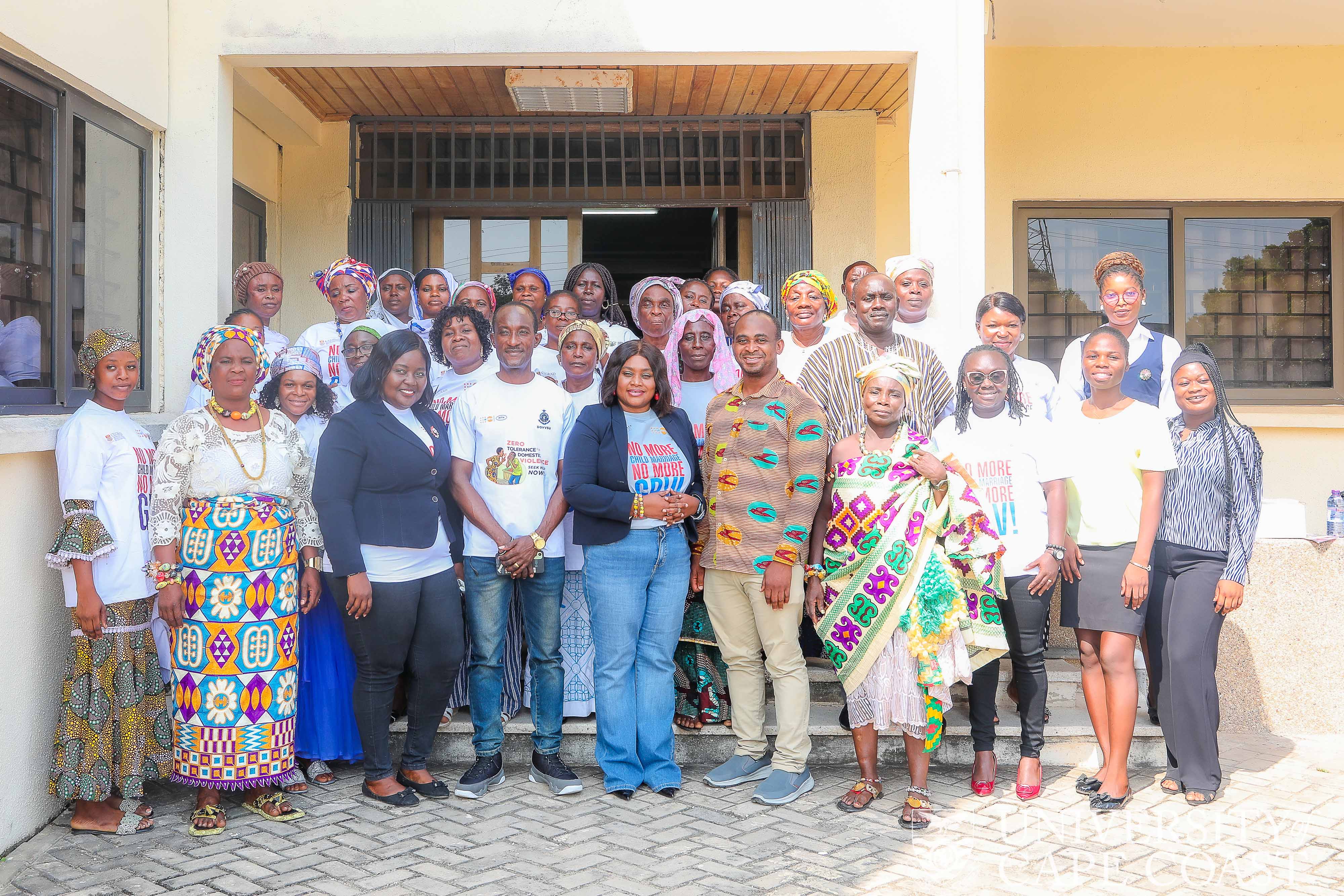
The Centre for Gender Research, Advocacy and Documentation (CEGRAD), University of Cape Coast (UCC) has held a one-day training workshop on gender-based violence (GBV) and harmful practices, including child marriage.
The workshop, “Empowering Women Leaders to Combat Child Marriage, Gender-Based Violence, and Harmful Practices in Selected Communities around the University of Cape Coast,” was supported by the United Nations Population Fund (UNFPA) and the Central Regional Coordinating Council.
The Director of CEGRAD, Prof. Eunice Fey Amissah, stated that the training sought to promote positive attitudes and values regarding gender-related issues.
Prof. Eunice Fey Amissah
She emphasised the importance of recognising and referring abuse cases to appropriate institutions for redress.
Prof. Amissah noted that a national risk review had identified child marriage, exploitation, and the abuse of vulnerable groups—especially women and children—as pressing concerns.
She stressed the need to equip traditional authorities to handle such issues effectively and revitalise traditional institutions as frontline agents of social protection.
She said, “Traditional leaders must move from being passive to active defenders of the vulnerable in their communities.”She emphasised the need for a sustained collaboration with traditional authorities and called for ongoing engagements to deepen awareness and response to GBV in communities.
“This must not be a one-off activity. Continuous engagement with registrars is crucial to fully addressing harmful cultural practices,” she said.
Dr. Yvonne Ami-Adjakloe, Coordinator of Advocacy and Outreach at CEGRAD, speaking on the topic “Empowering Mothers and Mentors,” said the protection of children must be taken seriously to shield them from abuse. She advised pupils to be courageous and report any abuse to security agencies.
Dr. Yvonne Ami-Adjakloe
“The Child Rights Law protects children from all forms of violence and states that the government must do everything to stop underage marriage,” she said.
She disclosed that 20 girls in Ghana marry before the age of 15, with the Central Region bearing the highest incidence of child marriage.
Dr. Ami-Adjakloe highlighted the ramifications of early marriage, including increased vulnerability to sexual and domestic violence, reproductive health complications, psychological trauma, and the perpetuation of poverty due to curtailed education and high school dropout rates.
To address these concerns, she proposed a comprehensive strategy centered on empowering community stakeholders.
She stressed that mothers and community leaders must serve as the first line of defense.
Key actionable steps included financially empowering mothers—since poverty often drives early marriages—and leveraging social media for targeted anti-child-marriage and anti-GBV campaigns.
According to her, there was the need for positive role modelling, consensus-building among traditional and religious leaders, and integrating men and boys into the solution.
Detective Chief Inspector Benjamin Wilson
In his presentation on the topic “Breaking the Cycle,” Detective Chief Inspector Benjamin Wilson of the Domestic Violence and Victim Support Unit (DOVVSU), Cape Coast, stated that child marriage is a violation of human rights and that no tradition can justify the exploitation and harm inflicted on young girls.
He emphasized the legal rights of adolescent girls, citing the 1992 Constitution and the Children’s Act 560 (1998).
He reiterated that no girl should be deprived of her rights and that abusers of the law would face consequences.
He urged young girls to stay informed, seek support, and focus on their education to build a future full of possibilities.
Some residents at the workhop
He maintained that parents remain key in the fight against child marriage, teenage pregnancies, and all forms of sexual and gender-based violence.
He indicated that child marriage remained persistent in some Ghanaian communities, adding that the practice is now often done in secrecy to avoid public criticism.
He also urged parents not to shun their daughters or force them into cohabitation.
At the end of the training, participants demonstrated the knowledge gained and expressed their readiness to engage adolescents within their communities.

University Practice Senior High School emerged winners of the first-ever Agri-Brain Challenge Inter-School Quiz Competition held in commemoration of the 50th anniversary celebrations of the School of Agriculture.
The quiz, which was to arouse the interest of second cycle institutions students to pursue agriculture at the tertiary level, had diverse questions from soil science, animal science, agriculture engineering and the practical aspects.
After a keen contest, University Practice SHS took the first position, while the second and third position went to Mfantsiman Girls SHS and Aggrey Memorial SHS, respectively.
Some students and teachers at the event
St. Augustine College, Assin Manso SHS, and Jukwa Senior High School earned deserving positions.
For their prizes, the winning school took home a trophy, an undisclosed amount of money and certificates.
The schools which placed second and third were each rewarded with undisclosed amounts of money.
The Chairman of the 50th anniversary Planning Committee and Head of Department of Animal Science, Prof. Julius Hagan, said the interest in the study of agriculture in senior high school and tertiary had declined considerably.
“So as a School we thought it wise to whip up the interest amongst young people to study agriculture in secondary school hence the quiz competition,” he added.
He said the selection of the schools was based on proximity and the agriculture programme offered at the schools.
Prof. Hagan congratulated the winners and wished the other better luck in the next edition.
He encouraged the students to take agriculture seriously, stressing: "Education is not only about what you learn in the classroom. It is also about applying knowledge to real-life situations. You have learned a lot about agriculture through this quiz competition now, go out and put that knowledge into action," he said.
The Dean of the School of Agriculture, Prof. Henry Degraft Acquah, in a brief remark, commended the participants for their excellent intellectual display in the competition.
Prof. Henry Degraft Acquah
He assured the students of the School's commitment and readiness to support them to pursue agriculture at the tertiary level.
The Quiz Master, Prof. Michael Adu, congratulated the contestants and urged the organisers to expand the competition to allow more schools to compete in the subsequent ones.
Prof. Michael Adu
The winners of the competition expressed their gratitude to the organisers of the programme for giving them the opportunity to acquire more knowledge about agriculture.
They also thanked their teachers for the achievement, and added that, “other students should take advantage of such opportunities to learn new things and win prizes for themselves.”
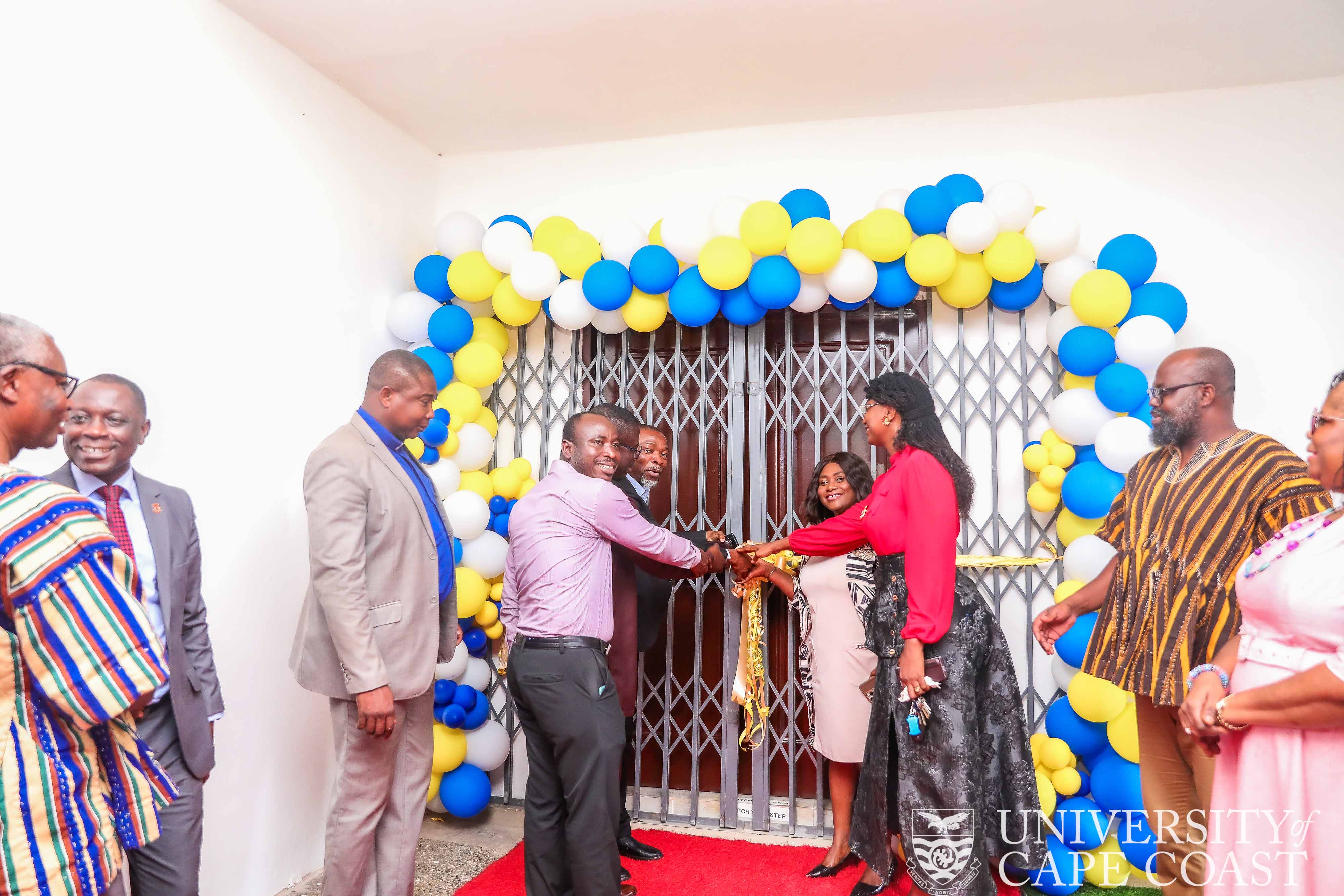
The University of Cape Coast (UCC), through the Department of Hospitality and Tourism Management, has opened a new Chinese restaurant.
The restaurant, known as Luban, located in the cafeteria building near Casely Hayford Hall, has established itself as a top destination for Chinese cuisine
The Luban Restaurant is the result of a partnership between UCC and the Tianjin Economics and Trade School.
It is poised to render top-quality service to members of the university community and its environs in a healthy environment.
It offers friendly, welcoming services and attends to customers’ needs within an appropriate time frame.
The Luban Restaurant is not just a food service facility; it is a classroom, a laboratory, and a bridge to the professional world.
Some chefs at the kitchen
The restaurant also has a conference room which can host up to 100 patrons for various events.
Speaking at the opening ceremony, the Provost of the College of Humanities and Legal Studies, Professor Daniel Agyapong, underlined the restaurant’s role in enriching the student experience.
He stated that the restaurant was a vital resource for students, explaining that it would serve as a practical laboratory, providing invaluable experience and equipping them with a highly sought-after skill.
Prof. Agyapong advised the staff of the restaurant to uphold two core values in its operations, consistency in the quality and taste of the food, and a commitment to excellent service.
For his part, the Head of the Department of Hospitality and Tourism Management, Professor Ishmael Mensah, said the partnership between the two institutions had transformed a ramshackle into an ultramodern Chinese restaurant with state-of-art equpment and and facilities capable of catering for over 100 guests at time.
According to him, through the restaurant, students gained hands-on experience in Chinese culinary techniques, food production, customer service, menu design, and restaurant management.
Prof. Ismael Mensah addressing the gathering
"They will interact with real customers, handle real issues, and develop practical skills. The Luban Workshop restaurant is a place where theory meets practice," he added.
Prof. Mensah paid glowing tribute to the Confucius Institue and the Tianjin Economics and Trade School led by Prof. Pan Rogna, stressing: " Your commitment, expertise, resources, and spirit of partnership has been the cornerstone of this project."
He appealed to the general public to patronise the Luban Workshop restaurant.
" Bring your friends here for lunch. Book our conference room for your meetings. Celebrate your family milestones here. Host your visiting friends in theis unique space. Remember, every meal you enjoy here is a direct investment into the future of a student," he contined.
The opening ceremony was well attended by students and staff of the University.

The FruitBunch Project has donated office furniture to the Department of Crop Science at the University of Cape Coast (UCC).
The items include swivel chairs and an 18-cubic-foot freezer for the storage of research materials in the pathology laboratory.
The donation follows the completion of the FruitBunch Project, which began on March 1, 2020.
The official presentation and handing-over ceremony was performed by the Coordinator of the FruitBunch Project, Prof. Michael Adu, and received by the Vice-Dean of the School of Agriculture, Prof. Paul Agu Asare, on behalf of the Department of Crop Science.
Prof. Michael Adu addressing the gathering
At the presentation, Prof. Adu expressed optimism that the furniture would enhance the learning environment for students and provide staff with better working conditions.
He further hoped that the items would be used for their intended purposes to improve administrative work.
Prof. Adu also urged staff of the Department to exhibit good maintenance culture to prolong the lifespan of the furniture.
For his part, the Vice-Dean expressed appreciation for the donation and noted it would significantly enhance the educational experience within the Department.
The Vice-Dean of the School of Agriculture, Prof. Paul Agu Asare
He lauded the FruitBunch Project and conveyed the Department’s gratitude for the gesture, adding, “We are most grateful, and like Oliver Twist, we ask for more.”
Prof. Asare pledged to ensure the longevity of the furniture and used the opportunity to call on well-meaning individuals and corporate organisations to similarly support the Department of Crop Science.

A training programme aimed at building the capacity of female lecturers to sharpen their skills and thrive in teaching, research, and leadership has ended at the University of Cape Coast (UCC).
The event was to empower participants to explore data management, open science, publication strategies, digital teaching tools, and flexible work approaches—tools essential for effective academic work.
The workshop formed part of the Ecosystem-based Management of Coastal Marine Resources in Ghana, Indonesia and Vietnam (ECOGIV) project on capacity development in higher education and research at three partner universities: Nha Trang University (NTU), IPB University, and UCC.
Funded by the Norwegian Agency for Development Cooperation (NORHED), the project was held on the theme: “Equipping Women for Impact in Teaching, Research, and Leadership.”
Participants were taken through topics such as Data Management and Open Science.
The workshop was facilitated by the Centre for Data Archiving, Management, Analysis and Advocacy (CDAMAA) at UCC, the first data-sharing and archiving centre established in Ghana to provide access to quality research data, increase knowledge discovery, and advocate for data-driven decision-making.
Addressing participants, the Head of the Department of Data Science and Economic Policy, Prof. Emmanuel Ekow Asmah, described the workshop as “timely and appropriate,” noting its significance in sharpening the skills of female lecturers at UCC.
He stressed the importance of accurate data and coordinated efforts to meet the university’s digitalisation agenda.
Prof. Asmah also underscored the crucial role of women in leadership, emphasising the need to amplify their voices and ensure their full participation in the digital age.
The Dean of the School of Economics, Prof. Isaac Dasmani, in his opening remarks, urged participants to embrace technology as a powerful ally in their mission.
Prof. Isaac Dasmani
He advised them to use digital tools not as distractions but as aids to make lessons more engaging, adding that they should blend the wisdom of traditional pedagogy with innovations of the digital age.
The Dean encouraged participants to apply the knowledge and skills gained to enhance teaching and learning.
The facilitator, Dr. William Godfred Cantah, of CDAMAA, explained that research data include any evidence, observations, or digital objects that generate or answer research questions—such as survey responses, interview transcripts, code, images, logs, and laboratory notes.
According to him, well-managed data make research more reproducible and transparent, helping other scholars understand methods and verify findings.
Dr. William Godfred Cantah speaking at the event
Dr. Cantah noted that funding agencies, journals, and universities now require data management plans and concrete evidence that researchers share and preserve their data.
“Adopting robust data practices is no longer optional but essential for compliance, accountability, and ethical responsibilities in research,” he added.
Dr. Cantah further urged the participants to recognise the transformative role of AI in teaching and learning.
He encouraged them to embrace the opportunities that digital technologies, including AI, present.
Dr. Cantah emphasised that AI was not a threat but rather a powerful enabler for teachers, amplifying their ability to guide, mentor, and inspire learners.
As part of the workshop, the facilitator took the participants through practical aspects of data management, open science, and Artificial intelligence.
Some participants told reporters that the programme would go a long way toward sharpening their digital skills.
They urged CDAMAA to organise more of such programmes to help lecturers develop the skills needed for their work.
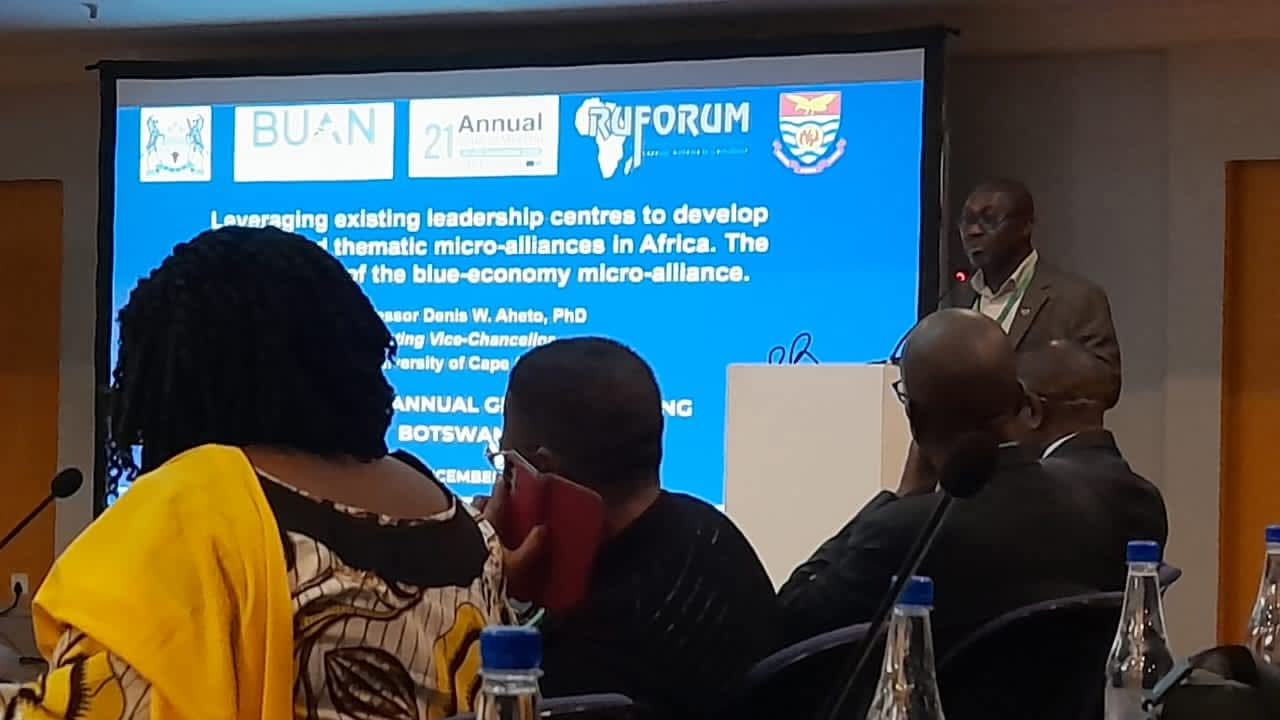
The Acting Vice-Chancellor of the University of Cape Coast (UCC), Professor Denis Worlanyo Aheto, has proposed a framework for creating sustainable and inclusive blue economy micro-alliances for fisheries development towards economic growth in Africa.
Prof. Aheto made this call at the Vice-Chancellor’s Forum at the 21st Regional Universities Forum for Capacity Building in Agriculture (RUFORUM) Annual General Meeting (AGM) in Gaborone, Botswana, where he delivered a lead paper titled “Leveraging Existing Leadership Centres to Develop Specialised Thematic Micro-Alliances in Africa: The Case of the Blue-Economy Micro-Alliance.”
RUFORUM is holding its 21st Annual General Meeting (AGM) between 1st and 5th December in Gaborone, Botswana, under the theme “Positioning Africa’s Universities and the Higher Education Sector to effectively impact development processes on the continent”.
The Ag. Vice-Chancellor noted that Africa possessed significant ocean resources, with 38 coastal states and six island nations, amounting to over 13 million square kilometres of ocean territory. He emphasised that the continent’s coastline, stretching approximately 26,000 nautical miles, underpins an ocean economy valued at USD 300 billion to support 49 million jobs as of 2018 but projected to rise significantly by 2030.
UCC delegation at the event
Prof. Aheto stressed that despite abundant marine resources, Africa had not fully harnessed the potential of sectors such as fisheries, aquaculture, shipping, coastal tourism, marine energy and ocean mining. Strengthening Centres of Excellence (CoEs), he noted, would provide a strategic pathway to achieving sustainable development and economic transformation.
The CoEs are critical for driving innovation, improving research, and building the high-level skills necessary for the continent’s growth, he said, citing successful models supported by the World Bank and the African Union.
In order to address these issues in the blue economy, Professor Aheto proposed a practical framework for establishing Blue Economy micro-alliances, emphasising clear identification of Centres of Excellence and shared strategic goals.
He further called for coordinated resource mobilisation, strong industry linkages, capacity building, and sustained monitoring and evaluation to enhance knowledge sharing, improve access to funding, and strengthen partnerships among universities, governments, and private sector actors.
Prof. Aheto underscored the importance of sustainable marine fisheries, noting that “while industrial fisheries struggle with issues such as overfishing and destructive practices, small-scale fisheries offer a more sustainable path aligned with Blue Economy principles.
He urged African governments, higher education institutions, and development partners to prioritise investment in the Blue Economy and support collaborative structures that will drive economic growth and poverty reduction.
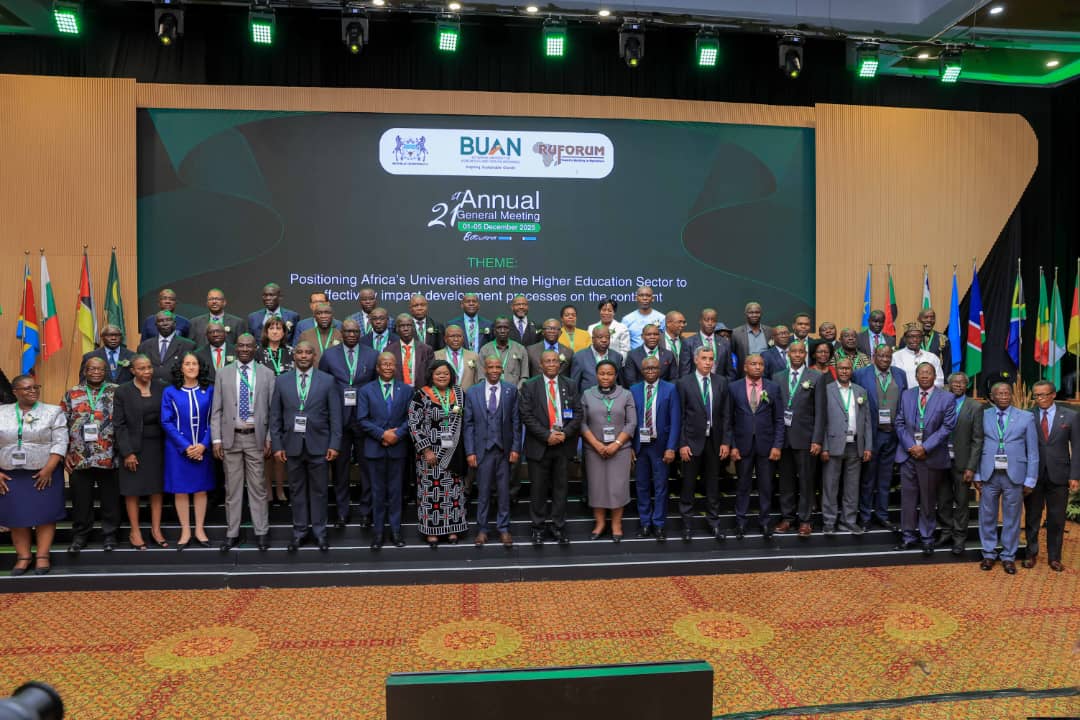
The 21st Annual General Meeting (AGM) of the Regional Universities Forum for Capacity Building in Agriculture (RUFORUM) has been officially opened in Gaborone, Botswana, with a call to Africans to champion homegrown innovation as a driver of transformation in higher education, research, and development across the continent.
The AGM, held under the theme, “Transforming Higher Education to Strengthen Africa’s Innovation Ecosystem,” brought together university leaders, researchers, policymakers, industry players, and development partners from across Africa and the global scientific community.
Hon. Prince Maele,
Opening the workshop, the Minister ofHigher Education and Technology, Hon. Prince Maele, noted that Africa’s development challenges could only be sustainably addressed through continental collaboration.
“Our challenges—climate change, food insecurity, youth unemployment—are shared. They demand shared, African-led solutions. This AGM provides the platform to build partnerships that will outlive borders,” he noted.
Prof. Patrick Okori
In his address, the Executive Secretary of RUFORUM, Prof. Patrick Okori, urged African universities to transition from traditional teaching models to innovation-powered institutions capable of shaping Africa’s future.
“Africa cannot transform without research-intensive universities that produce solutions, not just graduates. This AGM reminds us that transformation begins when Africans champion their own innovations,” Prof. Okori said.
UCC Takes Active Role at the AGM
The University of Cape Coast (UCC) is prominently represented by a team led by the Ag. Vice-Chancellor, Prof. Denis Worlanyo Aheto. With the team was the Vice-Chancellor of University of Energy and Natural Resources (UENR), Prof. Elvis Asare-Bediako. Other members at the AGM were the Provost, College of Agriculture and Natural Sciences (CANS), Prof. Rofela Combey, immediate past Provost of CANS, Prof. Moses Jojo Eghan, Coordinator of TAGDev 2.0 UCC, Prof. Festus Annor-Frempong, Associate Programme Officer, TAGDev 2.0, Dr. Zikiru Shaibu, partner institutions and some staff and students of UCC.
Ghana Delegation
Representatives from the partner institutions were Prof. Terry Ansah, University for Development Studies (UDS), Dr. Kwadwo Gyasi Santo, University of Energy and Natural Resources (UENR), Ms. Abigail Yvette Agbeteti, Adidome Farm Institute and Mr. Theophilus Kwame Soku, Asuansi Farm Institute.
Strategic Sub-Themes of the AGM
The 21st AGM is structured around six critical sub-themes: Strengthening Higher Education’s Role in Africa’s Innovation Ecosystem, Climate Change, Food Systems Transformation, and Environmental Sustainability, Digital Transformation, Technological Innovation and Future Skills, Youth Engagement, Employability, Agripreneurship and Leadership Development, Inclusive Partnerships for Research, Development and Economic Growth, Scaling Centres of Excellence and Strengthening Regional Research Networks
These focus areas are guiding scientific presentations, policy debates, and the formulation of actionable recommendations to support Africa’s development priorities.

